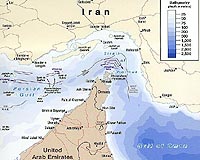| . |  |
. |
Moscow (AFP) June 18, 2009 An international centre that funds ex-Soviet weapons scientists to prevent their knowledge from falling into the hands of terrorists warned on Thursday that it faces steep budget cuts. "Our centre clearly has less funds available than two or three years ago," Adriaan van der Meer, executive director of the Moscow-based International Science and Technology Centre (ISTC), told AFP. Speaking after a press conference devoted to the centre's 15th anniversary, Van der Meer said the ISTC still played an important role in securing dangerous biological materials in Russia, the Caucasus and Central Asia. "Nowadays the world is so open that every action we take, wherever in the world, is relevant in preventing non-state actors -- as it's called in our jargon -- from getting hold of these materials," he said. The ISTC was founded in 1994 amid concern in the West that impoverished scientists from the former Soviet Union would start working for regimes determined to obtain weapons of mass destruction. Since then it has given assistance to more than 70,000 ex-Soviet scientists, and today it supplements the salaries of Russian researchers who earn an average of only 500 dollars (360 euros) per month. But its funding has plunged recently as donor governments have shifted the focus of nonproliferation efforts to countries like Pakistan, Iraq and Libya, and the global economic crisis has also taken its toll, Van der Meer said. Last year the centre spent 26.2 million dollars (18.9 million euros) on projects to support ex-Soviet scientists, a drop of nearly two-thirds from 2003, when it spent 74.4 million dollars (53.8 million euros). The ISTC is funded by the United States, the European Union and countries including Japan, Canada and South Korea. Van der Meer said the threat of Russian nuclear scientists helping foreign states acquire atomic weapons had dissipated since the 1990s, as the country emerged from the chaos following the collapse of the Soviet Union. But he warned that stashes of dangerous microbes still posed a risk and said the ISTC had stepped up its work with laboratories that dealt with diseases like influenza and tuberculosis. "In the bio-sector we are catching up by providing possibilities for high-level, safe storage of collections," he said. "The preventive approach needs to be stronger, and we are working on that." Share This Article With Planet Earth
Related Links The latest in Military Technology for the 21st century at SpaceWar.com
 Flash point Hormuz: Countering mine peril
Flash point Hormuz: Countering mine perilManama, Bahrain (UPI) Jun 16, 2009 Britain's Royal Navy has reinforced its mine-hunting capabilities in the Gulf and the Strait of Hormuz, the only way in and out of the strategic waterway through which some 40 percent of the world's oil supplies pass. The deployment has coincided with concerns that Iran would retaliate against any U.S. or Israeli attacks on its nuclear infrastructure and other strategic targets by ... read more |
|
| The content herein, unless otherwise known to be public domain, are Copyright 1995-2009 - SpaceDaily. AFP and UPI Wire Stories are copyright Agence France-Presse and United Press International. ESA Portal Reports are copyright European Space Agency. All NASA sourced material is public domain. Additional copyrights may apply in whole or part to other bona fide parties. Advertising does not imply endorsement,agreement or approval of any opinions, statements or information provided by SpaceDaily on any Web page published or hosted by SpaceDaily. Privacy Statement |